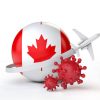Career
Types of Canada Visa to Apply For
Canada is known for its inclusive and diverse immigration policies, offering a range of visa categories to accommodate individuals with different intentions and qualifications. Before embarking on your journey to immigrate to Canada, it’s crucial to familiarize yourself with these options, as selecting the right one is key to a successful application. In this article, we will explore the different types of Canadian visas and provide a comprehensive overview of each category.
1. Study Visa
The Student Visa is one of the most sought-after options for those who wish to upgrade their academic careers and obtain a world-class education in Canada. Canadian educational institutions are renowned for their quality and diversity, making Canada a preferred destination for students from all around the world. Obtaining a Student Visa enables you to pursue various levels of education, from undergraduate and postgraduate degrees to diplomas and certificates. To be eligible for a Student Visa, you need an acceptance letter from a Canadian educational institution, proof of sufficient funds to cover your tuition and living expenses, and a clean bill of health. Additionally, you must not have a criminal record. The Student Visa is a pathway that can lead to Post-Graduation Work Permits (PGWP) and, eventually, Permanent Residency if you meet the criteria.
2. Business Visa
The Business Visa is designed for individuals with substantial capital who want to invest in and start a business in Canada. To be eligible for this type of visa, you are required to invest a minimum amount in a Canadian business. Currently, the minimum investment threshold is $200,000, but it can vary depending on the specific business and province. The purpose of this visa is to stimulate economic growth in Canada by attracting entrepreneurs, creating jobs, and fostering innovation. To qualify, your investment must be made in a business that will contribute to the Canadian economy. Business Visa applicants must also demonstrate that their investment capital is legally obtained and show a clean financial history.
3. Visit Visa
The Visit Visa, also known as a Tourist Visa, is intended for individuals who want to explore Canada’s vast landscapes, vibrant cities, and diverse culture. It is suitable for tourists, family visitors, and individuals attending events, conferences, or ceremonies in Canada. Obtaining a Visit Visa requires demonstrating the purpose of your visit, sufficient funds to cover your stay, and a return ticket to your home country. While Visit Visas are typically temporary, they provide the opportunity to experience the beauty and hospitality of Canada.
4. Working Holiday Visa
The Working Holiday Visa allows young people aged 18-35 (the age limit varies depending on your home country) to work and travel in Canada for up to 12 or 24 months, depending on your country of origin. This program is designed to promote cultural exchange and international relations. To be eligible, you must be a citizen of a country that has a bilateral agreement with Canada for a Working Holiday Visa. The primary purpose of this visa is to provide an opportunity for young individuals to explore Canada, gain work experience, and immerse themselves in Canadian culture. It’s important to note that this is a temporary visa and does not lead to Permanent Residency.
5. Permanent Residency Visa
The Permanent Visa, often referred to as Permanent Residency (PR), is for individuals who are ready to make Canada their permanent home and stay in the country for an extended period. It is a significant step towards becoming a Canadian citizen, if desired. Permanent Residents have the right to live and work anywhere in Canada, access most social benefits and services available to Canadian citizens, and are protected under Canadian law and the Canadian Charter of Rights and Freedoms.
To be eligible for PR, there are various pathways, each with its own specific criteria:
Express Entry: This system manages applications for the Federal Skilled Worker Program (FSWP), Canadian Experience Class (CEC), and some Provincial Nominee Programs (PNPs). Candidates create an online profile and are assigned points based on factors like age, education, work experience, language proficiency, and adaptability. Those with the highest Comprehensive Ranking System (CRS) scores receive invitations to apply for PR.
Provincial Nominee Program (PNP): Each province in Canada has its own PNP. If a province nominates you, it enhances your PR application with additional points, significantly increasing your chances of obtaining PR.
Quebec Program: Quebec has its own unique immigration programs due to its distinct status and language requirements. If you plan to settle in Quebec, you’ll need to navigate its specific immigration pathways.
Family Sponsorship: Canadian citizens or Permanent Residents can sponsor eligible family members, such as spouses, partners, children, parents, or grandparents, to become Permanent Residents. Family reunification is a core aspect of Canadian immigration policy.
Entrepreneurs and Investors: If you have a business idea or wish to invest in Canada, certain provincial programs and the Start-up Visa Program offer pathways to PR. These programs are designed to attract individuals who can contribute to Canada’s economy and create job opportunities.
Caregivers: Caregivers who have provided care for Canadian children, the elderly, or those with medical needs may be eligible to apply for PR through specific caregiver programs. This pathway recognizes the valuable contributions of caregivers to Canadian society.
Refugees and Protected Persons: Individuals who have been granted refugee status or protected person status in Canada can apply for PR. This pathway provides refuge and a new start to those fleeing persecution and violence in their home countries.
Temporary Foreign Workers: Some pathways allow individuals working in Canada on a temporary basis to transition to PR, especially if their skills are in demand. These programs are designed to retain skilled workers who are already contributing to the Canadian workforce.
Visa Costs and Requirements
The cost of each Canadian visa varies based on the type of visa you want to apply for. However, it’s essential to research the specific visa that best suits your needs and understand the associated costs and requirements. When budgeting for your immigration journey, consider not only the visa fees but also other expenses like medical exams, police clearance certificates, language proficiency tests, and credential assessments, depending on the type of visa you’re applying for.
Here are some examples of visa costs:
- Visitor Visa: Approximately $500
- Work Permit: Around $155
- Visitor Record: About $75
- Study Permit: Approximately $175
Please note that these fees are subject to change and may vary depending on your country of residence. Additionally, these fees do not cover other expenses such as travel, accommodation, and the cost of supporting documents.
When applying for a Canadian visa, regardless of the type, you’ll be required to provide supporting documents that demonstrate your eligibility. The specific documents you need to submit vary depending on the visa category. For instance, if you are applying for a student visa, you will be required to provide your acceptance letter from a Canadian educational institution and show financial proof that you have the means to support your studies and living expenses in Canada. Similarly, if you are applying for a business visa, you must provide evidence that your assets have been legally obtained and demonstrate a clean financial history.
General requirements applicable to most visa types include:
- Medical Reports: You must be able to demonstrate that you do not have serious ailments or communicable diseases that could pose a risk to public health in Canada. Undergoing a medical examination by an approved panel physician is often necessary.
- Police Reports: A police clearance certificate or criminal record check is usually required to assess whether you have engaged in any criminal activities in the past. This is an essential step in ensuring the safety and security of Canadian society.
In conclusion, understanding the various Canadian visa options and their specific requirements is crucial for your journey to immigrate to Canada. Each visa type has its own prerequisites, application processes, and eligibility criteria. Whether you are a student seeking educational opportunities, an entrepreneur looking to invest, a visitor wanting to explore the country, or a worker pursuing a career in Canada, the Canadian immigration system offers a diverse range of pathways to achieve your goals and dreams. By thoroughly researching your options, preparing the necessary documents, and meeting the requirements, you can embark on a successful journey towards obtaining a Canadian visa and potentially becoming a Permanent Resident, opening doors to new opportunities and a promising future in one of the world’s most welcoming and diverse nations.


















